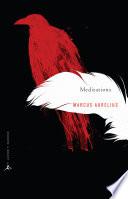Quotes from book
Meditations

Meditations is a series of personal writings by Marcus Aurelius, Roman Emperor from 161 to 180 AD, recording his private notes to himself and ideas on Stoic philosophy.

“Thou sufferest justly: for thou choosest rather to become good to-morrow than to be good to-day.”
VIII, 22
Meditations (c. 121–180 AD), Book VIII

“To a rational being it is the same thing to act according to nature and according to reason.”
VII, 11
Meditations (c. 121–180 AD), Book VII

“All that happens is as usual and familiar as the rose in spring and the crop in summer.”
IV, 44
Meditations (c. 121–180 AD), Book IV

“Nothing can come out of nothing, any more than a thing can go back to nothing.”
Source: Meditations (c. 121–180 AD), Book IV, 4

“All is ephemeral — fame and the famous as well.”
Πᾶν ἐφήμερον, καὶ τὸ μνημονεῦον καὶ τὸ μνημονευόμενον.
IV, 35
Meditations (c. 121–180 AD), Book IV

“All those [events in history] were such dramas as we see now, only with different actors.”
X, 27
Meditations (c. 121–180 AD), Book X